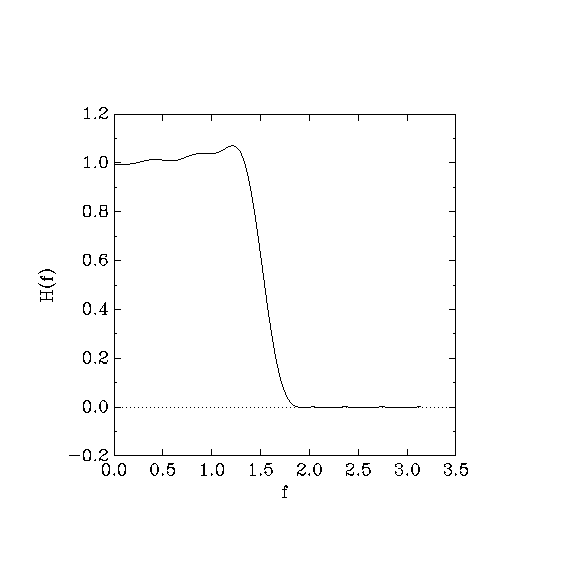
In this example, we design the zero-order-hold compensator example from Oppenheim and Schafer, Discrete-Time Signal Processing, 1st ed., Section 7.7.2.
The specifications are as follows. The sampling frequency is 2 PI, the passband is [0..0.4 PI], the stopband is [0.6 PI..PI]. The frequency response is not flat in the passband, but it has the form H(f) = (f / 2) / (sin (f / 2)). (See Oppenheim and Schafer for why you may want such a filter.) The stopband error is 1/10 of the passband error. The specification file follows.
(title "Compensation for Zero-Order Hold")
(cosine-symmetry)
(filter-length 29)
(define pi (* 4 (atan 1))) ; pi = 3.14...
(define 2pi (* 2 pi)) ; 2pi = 2 * pi
(define (*2pi x) (* 2pi x)) ; a function that multiplies x by 2pi
(sampling-frequency (*2pi 1))
(define passband (band 0 (*2pi 0.2)))
(define stopband (band (*2pi 0.3) (*2pi 0.5)))
(limit-= passband (lambda (f)
(if (= f 0)
1
(/ (/ f 2) (sin (/ f 2))))))
(limit-= stopband 0 .1)
(output-file "example-7.coef")
(plot-file "example-7.plot")
(go)
A graph of the frequency response follows.

This example does not really introduce any new gmeteor concept,
but it shows some more useful Scheme constructs.
The expression (define var value) defines a new
variable var with value value. The similar expression
(define (var arg) body) defines a function, and
it is equivalent to (define var (lambda (arg)
body)).
A variable can contain an arbitrary object. In particular, the expression
(define passband (band 0 (*2pi 0.2)))
defines the variable passband and sets it value to the
band (band 0 (*2pi 0.2)). This construct is useful if the
passband is used in many places.
The expression (if test if-expr else-expr)
denotes a conditional expression. In our example, we use it to avoid
division by 0.